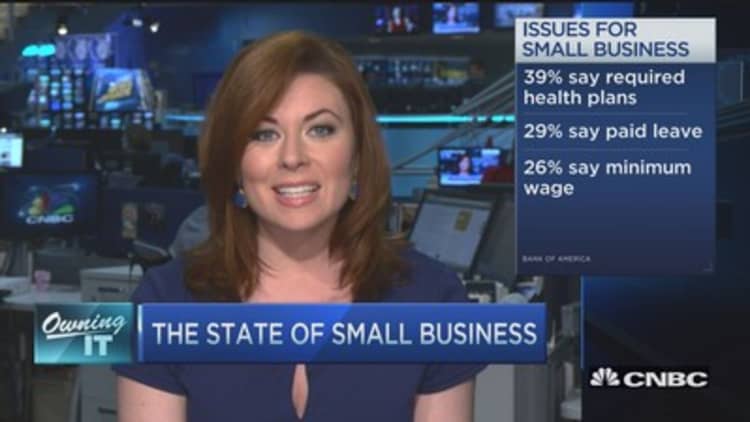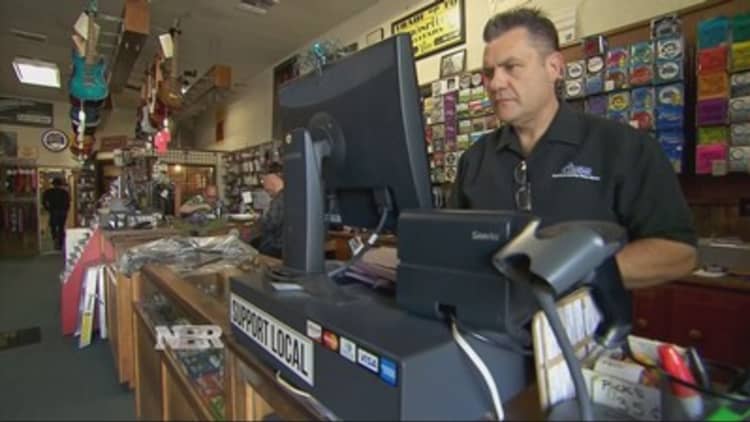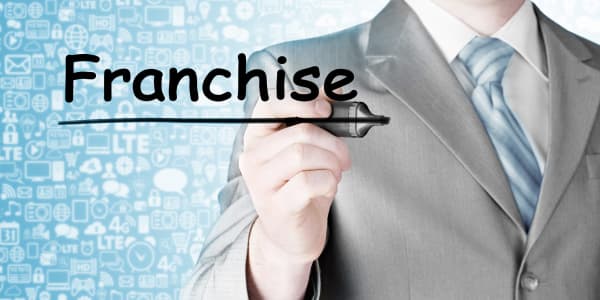
As the U.S. economy and stock market have picked up since the depths of the Great Recession, the experiences of small-business owners have been mixed. Main Street largely is on the fence about the near-term outlook and lending activity is far from robust, a trend called out by everyone from community banks to Fed Chair Janet Yellen.
Now with the 2016 election looming, debate over Main Street's prospects is only likely to intensify. Big issues weigh on entrepreneurs including the fight for a higher, national minimum wage, health-care costs, taxes and the credit markets among other key topics.
"A big problem throughout the Great Recession that continues today is overall access to capital," said Tim Reynolds, chair of the nonpartisan National Small Business Association and owner of Tribute, a small software company in Ohio.
A key reading on Main Street is the monthly optimism index from the National Federation of Independent Business. The March index, the most recent data available, fell to 95.2—the lowest reading since June 2014. "Overall the economy will keep moving forward, but more like a turtle than a hare," according to Bill Dunkelberg, NFIB's chief economist. (Tweet This)
Minimum wage and benefits
While the national minimum wage is at $7.25 an hour, a slew of large companies have recently hiked their minimum pay including Target, T.J. Maxx, McDonald's, Wal-Mart and the Gap.
Read More McDonald's to raise pay as franchises may feel new pressure
Last week, congressional democrats unveiled their plan to hike the federal minimum wage to $12 an hour by 2020, which is sure to be a key talking point for candidates heading into the 2016 election. While most NFIB business members pay above the federal minimum of $7.25 an hour, Jack Mozloom, a spokesman for the conservative advocacy group, says those who don't offer higher wages can't afford higher pay.
"Everyone supports higher wages for workers, but you can't have a government mandate for higher pay when you don't have the sales to support additional costs," Mozloom said.
Supporters of higher wages disagree, of course. The National Employment Law Project recently applauded the introduction of the Raise the Wage Act of 2015, which would gradually raise the federal minimum wage to $12, index the rate to rise yearly and eliminate the subminimum wage for tipped employees.
"With the economy still tilting toward low-paying jobs, the nation needs bolder action to improve jobs across the bottom of the economy," said Christine Owens, executive director of NELP, in a prepared statement.
Raising wages is likely to be part of a larger discussion about benefits.
President Barack Obama has also advocated for paid sick leave. He has directed federal agencies to give employees up to six weeks after the birth or adoption of a child. The move is something democrats would like to see extended to all workers.
Read More Obama plans to push paid family and sick leave for workers
A separate Bank of America report recently found 29 percent of those surveyed said mandated sick leave would have the greatest negative impact on their small business. About 26 percent said a higher minimum wage would take the biggest toll, according to the research released last week.

Beyond concerns about benefits and wages, business owners often grumble about "regulatory uncertainty" and red tape broadly.
Health care and taxes
"The overall regulatory environment continues to be complex and vague," said Reynolds of the National Small Business Association.
Of course a key example is the Affordable Care Act, which is facing a Supreme Court decision. Businesses with 100 or more full-time workers must offer their employees insurance or face penalties this calendar year for failing to comply.
Read More Obamacare case's threat to small biz workers ain't small
Small-business watchers also hope the election will bring a focus to taxes impacting entrepreneurs—not just discussions about corporate tax rates. Mozloom says the NFIB would like to see commitment to reducing taxes for Main Street, where many pay income taxes on an individual basis.
"Our members don't see what's fair about cutting taxes for the biggest, wealthiest corporations but not for them," Mozloom said.
Credit markets
Heading into a presidential election year, lending activity will also come into bigger focus.
For most of the Great Recession, record numbers of small companies were on the credit sidelines, seeing no good reason to borrow. Rough 32 percent of all owners reported borrowing on a regular basis, according to recent NFIB data. "Interest rates are low, but prospects for putting borrowed money profitably to work have not improved enough to induce owners to step up their borrowing and spending," according to the NFIB.
Added Reynolds, "What we saw were fewer community banks, and in general due to regulations, banks reluctant to lend to smaller companies."





